universal tensile testing machine manufacturer
Universal Tensile Testing Machine A Key Instrument in Material Testing
The quest for high-quality materials and resilient structures is at the core of engineering and manufacturing. One of the most essential tools in ensuring material integrity is the universal tensile testing machine. This device plays a pivotal role in determining the mechanical properties of materials, such as tensile strength, yield strength, elongation, and modulus of elasticity. As industries evolve and the demand for precision increases, the importance of universal tensile testing machines cannot be overstated.
What is a Universal Tensile Testing Machine?
A universal tensile testing machine (UTM) is a mechanical testing device that applies tensile (pulling) or compressive (pushing) forces to a test specimen. The machine is capable of conducting various types of tests, including tensile, compression, bending, and shear tests. It's equipped with an advanced load cell to measure the force applied and an extensometer to accurately gauge the elongation of the specimen. These features enable the UTM to provide precise and reliable data crucial for material evaluation.
Key Features and Functions
1. Versatility The universal tensile testing machine is designed to test a wide range of materials, including metals, plastics, composites, and textiles. Its versatility makes it invaluable across multiple industries, from construction and automotive to aerospace and manufacturing.
2. Digital Readouts Modern UTMs come with digital interfaces that allow for easy reading and interpretation of test results. Data acquisition systems can capture results in real-time, facilitating immediate analysis.
3. Adjustable Speed and Load Control Users can customize testing speeds and load applications based on the material characteristics and testing standards. This adaptability ensures consistent and accurate testing conditions.
4. Software Integration Advanced UTMs are equipped with sophisticated software that not only controls the testing process but also analyzes and reports the results. This software can generate graphs and detailed reports, aiding engineers in making informed decisions about material selection and usage.
Importance in Industry
Universal tensile testing machines are essential for quality control and assurance in manufacturing processes. By determining a material’s mechanical properties, manufacturers can ensure that the products meet required standards and specifications. Here are a few industry applications
- Construction In the construction industry, UTMs are used to test materials like concrete, steel, and composites to ensure they can withstand the forces they will encounter in structures.
universal tensile testing machine manufacturer

- Automotive In automotive engineering, these machines are crucial for testing metals and composites used in vehicle parts, ensuring safety and performance.
- Aerospace The aerospace sector demands high precision and reliability; thus, UTMs help in testing materials to meet stringent regulatory requirements.
- Textiles In the textile industry, UTMs evaluate fabrics for tensile strength and stretchability, ensuring durability and performance in end products.
Choosing a Manufacturer
When selecting a manufacturer for a universal tensile testing machine, several factors should be considered
- Reputation Research the manufacturer’s reputation in the industry. Look for reviews, case studies, and testimonials to assess the quality of their machines and customer service.
- Customization Options Different applications may necessitate specific features or configurations. A good manufacturer should offer customizable options to meet diverse testing needs.
- Post-Sale Support Excellent after-sales support, including installation, training, and maintenance, is essential. A reliable manufacturer will provide ongoing support to ensure the longevity of the equipment.
- Compliance with Standards Ensure that the machines adhere to international testing standards, such as ASTM or ISO guidelines, which guarantee the accuracy and reliability of test results.
Conclusion
Universal tensile testing machines are indispensable tools in the material testing landscape. Their ability to provide critical data about material properties ensures that industries can produce safe, reliable, and high-quality products. By selecting a reputable manufacturer that offers cutting-edge technology and comprehensive support, businesses can enhance their material testing processes, ultimately leading to innovation and improvement in product development. The ongoing advancement of UTM technology will continue to play a significant role in shaping the future of material science and engineering.
-
Why the Conductor Resistance Constant Temperature Measurement Machine Redefines Precision
NewsJun.20,2025
-
Reliable Testing Starts Here: Why the High Insulation Resistance Measuring Instrument Is a Must-Have
NewsJun.20,2025
-
Flexible Cable Flexing Test Equipment: The Precision Standard for Cable Durability and Performance Testing
NewsJun.20,2025
-
Digital Measurement Projector: Precision Visualization for Modern Manufacturing
NewsJun.20,2025
-
Computer Control Electronic Tensile Tester: Precision and Power for the Modern Metal Industry
NewsJun.20,2025
-
Cable Spark Tester: Your Ultimate Insulation Assurance for Wire and Cable Testing
NewsJun.20,2025
 Copyright © 2025 Hebei Fangyuan Instrument & Equipment Co.,Ltd. All Rights Reserved. Sitemap | Privacy Policy
Copyright © 2025 Hebei Fangyuan Instrument & Equipment Co.,Ltd. All Rights Reserved. Sitemap | Privacy Policy
